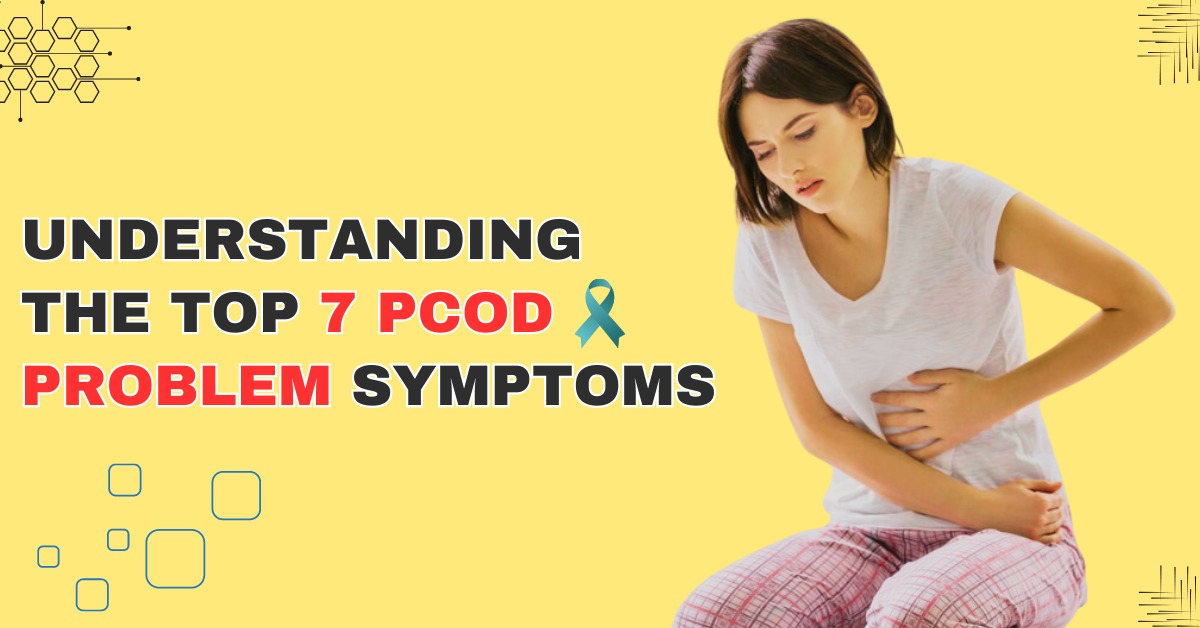
Understanding The Top 7 PCOD Problem Symptoms
PCOD problem symptoms
PCOD, or Polycystic Ovary Syndrome, is a common hormonal disorder among women of reproductive age. It involves hormonal imbalances, leading to irregular menstrual cycles, cysts in the ovaries, and symptoms like excessive hair growth, acne, and weight gain. PCOD can also impact fertility and increase the risk of long-term health complications like diabetes.
Introduction
Polycystic Ovary Syndrome (PCOS), also known as Polycystic Ovarian Disease (PCOD), is a common endocrine disorder affecting women of reproductive age. It is characterized by hormonal imbalances, leading to a range of symptoms such as irregular menstrual cycles, cysts on the ovaries, excessive androgen levels, and metabolic disturbances. PCOS can manifest differently in each individual, presenting challenges in diagnosis and management. It often leads to complications like infertility, obesity, type 2 diabetes, and cardiovascular diseases if left untreated. Management typically involves a combination of lifestyle changes, medication to regulate hormones, and sometimes fertility treatments for those trying to conceive.
Early detection and tailored treatment are crucial in mitigating the long-term health risks associated with PCOS. Addressing PCOD problem symptoms promptly can improve outcomes and quality of life for individuals with this condition.
The Difference Between PCOS & PCOD
PCOS stands for Polycystic Ovary Syndrome, while PCOD stands for Polycystic Ovarian Disease. Both conditions involve hormonal imbalances and cyst formation in the ovaries. PCOS encompasses a broader spectrum of symptoms, including irregular periods, infertility, excessive hair growth, and acne. PCOD primarily refers to the presence of multiple cysts in the ovaries. While PCOD is a physical manifestation, PCOS involves a wider array of metabolic and hormonal disturbances, often leading to more severe health implications.

The Top 7 PCOD Problem Symptoms
Identifying early PCOD problem symptoms is crucial for several reasons. Firstly, it allows for prompt intervention, which can effectively manage symptoms and prevent complications such as infertility, type 2 diabetes, and heart disease. Addressing symptoms early can also prevent the development or progression of associated complications like insulin resistance and cardiovascular disease. Overall, early identification facilitates timely intervention, leading to better health outcomes and reduced long-term health risks.
Irregular Menstrual Cycles
One of the hallmark symptoms of PCOS is irregular periods. Women with PCOD problem symptoms may experience infrequent or prolonged menstrual cycles, or even skip periods altogether. This irregularity occurs due to hormonal imbalances that disrupt the normal ovulation process.
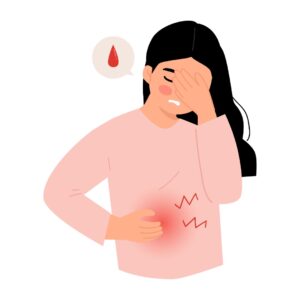
Managing irregular menstrual cycles in polycystic ovarian disease (PCOD) typically involves a multifaceted approach to addressing PCOD problem symptoms. Here are five points that can help:
- Healthy Diet and Regular Exercise: Adopting a balanced diet low in refined carbohydrates and high in fiber, lean proteins, and healthy fats can help regulate insulin levels and promote weight management, which is crucial in PCOD.
- Medication: Depending on the specific symptoms and underlying hormonal imbalances, your healthcare provider may prescribe medications such as oral contraceptives, metformin (to improve insulin sensitivity), or other hormonal treatments to help regulate your menstrual cycles and manage other PCOD symptoms, addressing PCOD problem symptoms.
- Lifestyle Changes: Stress management techniques such as yoga, meditation, or deep breathing exercises can help reduce stress levels, which can contribute to hormonal imbalances and exacerbate PCOD problem symptoms.
- Regular Monitoring and Follow-up: Regular check-ups with your healthcare provider are essential to monitor your progress, adjust medications or treatment plans as needed, and address any new or ongoing concerns, related to PCOD problem symptoms.
- Education and Support: Educating yourself about PCOD and seeking support from healthcare professionals, support groups, or online communities can help you better understand your condition, cope with its challenges, and make informed decisions about your treatment and lifestyle choices, important for managing PCOD problem symptoms.
Remember that managing PCOD and irregular menstrual cycles may require patience and persistence, as it can take time to find the right combination of lifestyle changes, medications, and other treatments that work best for you.
Excessive Hair Growth (Hirsutism)
PCOS can cause excessive hair growth in areas such as the face, chest, and back. This condition, known as hirsutism, results from elevated levels of androgens, or male hormones, in the body. Women with PCOD problem symptoms may also experience thinning hair on the scalp, resembling male pattern baldness.

Here are five strategies for managing excessive hair growth (hirsutism) related to PCOS (Polycystic Ovarian Syndrome):
- Medication: Your doctor may prescribe medications to regulate your menstrual cycle and reduce androgen levels, which can help control excessive hair growth and other PCOD problem symptoms.
- Lifestyle Changes: Adopting a healthy lifestyle can help manage PCOS symptoms and alleviate PCOD problem symptoms. This includes maintaining a balanced diet, exercising regularly, and managing stress levels.
- Hair Removal Techniques: Various hair removal techniques can help manage excessive hair growth associated with PCOD problem symptoms, including shaving, waxing, threading, and using depilatory creams.
- Topical Treatments: Certain topical treatments, such as prescription creams containing eflornithine, can help slow down the growth of facial hair, addressing one of the common PCOD problem symptoms.
- Consultation with Specialists: It’s essential to work closely with healthcare professionals specializing in PCOS management to address PCOD problem symptoms.
Remember, the effectiveness of these strategies may vary from person to person, so it’s crucial to consult with your healthcare provider to determine the best approach for managing your PCOD problem symptoms.
Acne and Oily Skin
Hormonal fluctuations associated with PCOS can lead to acne breakouts and excessively oily skin. These skin issues often persist despite regular skincare routines and can significantly impact self-esteem and confidence.
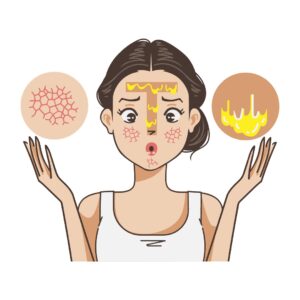
Managing acne and oily skin cycles in PCOD (Polycystic Ovarian Disease) can be challenging, but here are five points that may help:
- Balanced Diet: Focus on a balanced diet that is low in refined sugars and carbohydrates. Opt for whole grains, fruits, vegetables, and lean proteins. Avoid sugary snacks and processed foods as they can exacerbate acne and oily skin.
- Regular Exercise: Engage in regular physical activity to help regulate hormone levels and improve insulin sensitivity, both of which can contribute to PCOD symptoms.
- Skincare Routine: Establish a consistent skincare routine tailored to acne-prone and oily skin. Use gentle, non-comedogenic products to cleanse and moisturize the skin. Incorporate ingredients like salicylic acid or benzoyl peroxide to target acne.
- Stress Management: PCOD symptoms can be exacerbated by stress, so finding ways to manage stress levels is crucial. Practice relaxation techniques such as meditation, deep breathing exercises, yoga, or engaging in hobbies that you enjoy.
- Medical Treatment: Consult with a healthcare professional, such as a dermatologist or gynecologist, for personalized medical treatment options. Depending on the severity of your symptoms, they may recommend medications like birth control pills to regulate hormones, anti-androgen medications, or topical acne treatments.
Remember, it may take time to find the right combination of lifestyle changes and treatments that work best for you, so be patient and persistent in your efforts to manage PCOD symptoms.
Weight Gain and Difficulty Losing Weight
Many women with PCOD problem symptoms struggle with weight gain, particularly around the abdomen. This weight gain is often stubborn and resistant to traditional diet and exercise regimens. Insulin resistance, a common feature of PCOS, can further exacerbate weight management challenges.
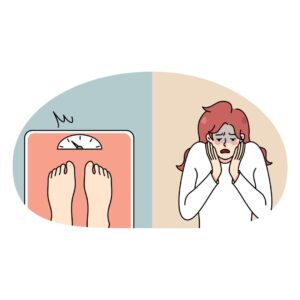
PCOD (Polycystic Ovarian Disease) can indeed make it challenging to manage weight due to hormonal imbalances and other factors. Here are five points to consider for addressing weight gain and difficulty losing weight in PCOD:
- Balanced Diet: Focus on a balanced diet that includes plenty of fruits, vegetables, lean proteins, and whole grains. Limit intake of processed foods, sugary snacks, and refined carbohydrates.
- Regular Exercise: Engage in regular physical activity to help manage weight and improve insulin sensitivity. Aim for at least 150 minutes of moderate-intensity aerobic activity per week, along with strength training exercises. Find activities you enjoy to make exercise a sustainable part of your routine.
- Manage Stress: High stress levels can exacerbate PCOD symptoms and contribute to weight gain. Incorporate stress-reduction techniques such as yoga, meditation, deep breathing exercises, or hobbies that promote relaxation. Adequate sleep is also essential for managing stress and overall well-being.
- Medical Treatment: Consult with a healthcare provider for personalized medical treatment options. They may prescribe medications such as metformin to improve insulin sensitivity or birth control pills to regulate menstrual cycles and hormone levels.
- Lifestyle Modifications: Make lifestyle changes to support weight management and overall health. This includes avoiding smoking and excessive alcohol consumption, staying hydrated, and maintaining regular follow-ups with your healthcare provider to monitor progress and adjust treatment as needed.
Remember, managing PCOD and weight requires a comprehensive approach tailored to individual needs. Consult with healthcare professionals, such as endocrinologists, gynecologists, or nutritionists, for personalized guidance and support.
Insulin Resistance and Type 2 Diabetes
Insulin resistance, a condition in which the body’s cells become resistant to the effects of insulin, is prevalent among women with PCOD problem symptoms. This can lead to elevated blood sugar levels and an increased risk of developing type 2 diabetes if left unmanaged.
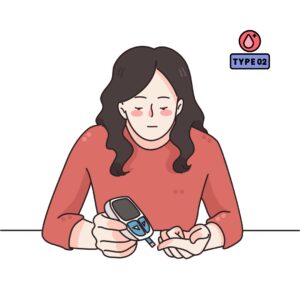
Managing insulin resistance and type 2 diabetes in PCOS (Polycystic Ovarian Syndrome) involves a multifaceted approach. Here are five key points:
- Balanced Diet: Adopt a low glycemic index (GI) diet rich in fruits, vegetables, whole grains, lean proteins, and healthy fats. Limit intake of processed foods, sugary snacks, and refined carbohydrates.
- Regular Exercise: Engage in regular physical activity to improve insulin sensitivity and promote weight loss. Aim for at least 150 minutes of moderate aerobic exercise or 75 minutes of vigorous activity per week.
- Weight Management: Achieve and maintain a healthy weight through a combination of diet and exercise. Even a modest weight loss of 5-10% can significantly improve insulin sensitivity and hormonal balance in PCOS.
- Medication: Depending on individual needs and severity, medication may be prescribed to manage insulin resistance and diabetes. Metformin, a medication that improves insulin sensitivity and lowers blood sugar levels, is commonly used in PCOS patients with insulin resistance and diabetes.
- Lifestyle Changes: Implement healthy lifestyle habits such as stress management techniques, adequate sleep, and avoiding smoking and excessive alcohol consumption.
Remember, managing PCOS, insulin resistance, and type 2 diabetes is a long-term commitment. Consult with healthcare professionals for personalized advice and monitoring of your condition.
Mood Swings and Depression
Hormonal fluctuations associated with PCOS can impact mood stability, leading to mood swings, irritability, and in some cases, depression. The emotional toll of living with a chronic condition like PCOS should not be underestimated, and seeking support from mental health professionals is crucial.

Managing mood swings and depression in PCOD (Polycystic Ovarian Disease) can be challenging, but there are several steps you can take to alleviate symptoms. Here are five points to consider:
- Balanced Diet and Regular Exercise: Focus on a balanced diet rich in fruits, vegetables, whole grains, and lean proteins. Regular exercise, such as brisk walking, yoga, or swimming, can improve mood, reduce stress, and regulate hormone levels, which can help alleviate PCOD problem symptoms.
- Stress Management Techniques: Stress can exacerbate mood swings and depression in PCOD. Practice stress-reduction techniques such as mindfulness meditation, deep breathing exercises, or progressive muscle relaxation to help manage PCOD problem symptoms.
- Regular Sleep Patterns: Prioritize quality sleep by maintaining a consistent sleep schedule and creating a relaxing bedtime routine. Aim for 7-9 hours of sleep per night. Poor sleep can worsen mood swings and depression, so ensuring adequate rest is essential for managing PCOD problem symptoms.
- Medical Treatment and Therapy: Consult with a healthcare professional to explore medical treatment options for PCOD symptoms, including mood swings and depression. Hormonal birth control, antidepressant medications, or anti-anxiety medications may be prescribed to help manage PCOD problem symptoms effectively.
- Support Network and Education: Surround yourself with a supportive network of friends, family, or a support group who understand your condition and can provide encouragement and empathy. Educate yourself about PCOD and its impact on mental health to better understand your symptoms and treatment options for managing PCOD problem symptoms.
Remember that managing PCOD and its associated mood swings and depression is a journey that may require ongoing effort and adjustments. Be patient with yourself, prioritize self-care, and seek professional help when needed.
Fertility Issues
PCOS is a leading cause of female infertility due to irregular ovulation or lack thereof. Women with PCOD problem symptoms may struggle to conceive naturally and often require medical intervention such as fertility treatments to achieve pregnancy.

Certainly! Here are five points to consider when addressing fertility issues in PCOD (Polycystic Ovarian Disease):
- Lifestyle Changes: Adopting a healthy lifestyle can significantly improve fertility in women with PCOD problem symptoms. This includes maintaining a balanced diet rich in fruits, vegetables, whole grains, and lean proteins.
- Medication: Your doctor may prescribe medication to regulate your menstrual cycle and induce ovulation, especially if you’re experiencing PCOD problem symptoms. Common medications include oral contraceptives, metformin (to improve insulin sensitivity), and ovulation-inducing drugs such as clomiphene citrate or letrozole.
- Monitoring and Tracking Ovulation: Keeping track of your menstrual cycle and monitoring ovulation can help increase your chances of conceiving, particularly if you have PCOD problem symptoms. This can be done through methods such as tracking basal body temperature, using ovulation predictor kits, or monitoring changes in cervical mucus.
- Fertility Treatments: In cases where lifestyle changes and medication alone are not effective, fertility treatments such as in vitro fertilization (IVF) or intrauterine insemination (IUI) may be recommended to address PCOD problem symptoms.
- Manage Stress: High levels of stress can exacerbate PCOD problem symptoms and interfere with fertility. Finding healthy ways to manage stress, such as practicing yoga, meditation, or seeking counseling, can be beneficial for both physical and emotional well-being.
It’s important to work closely with your healthcare provider to develop a personalized treatment plan tailored to your specific needs and circumstances, especially if you’re experiencing PCOD problem symptoms.
Conclusion
Recognizing the symptoms of PCOS is the first step toward diagnosis and treatment. If you suspect you may have PCOS based on the PCOD problem symptoms discussed in this blog, it’s essential to consult with a healthcare provider experienced in managing hormonal disorders. With early intervention and appropriate medical care, women with PCOD problem symptoms can effectively manage their symptoms and improve their overall quality of life.
FAQs
1. What is the main reason for PCOD?
The exact cause of PCOD (Polycystic Ovarian Disease) is not fully understood, but it is believed to involve a combination of genetic, hormonal, and lifestyle factors. Insulin resistance and hormonal imbalances, particularly elevated levels of androgens (male hormones), are key factors contributing to PCOD.
2. How do I know if I have PCOD problems?
You may have PCOD (Polycystic Ovarian Disease) if you experience irregular periods, heavy bleeding, acne, excessive hair growth, weight gain, or difficulty conceiving. A healthcare provider can diagnose PCOD through medical history, physical examination, and tests like hormone levels and ultrasound.
3. How can I improve my PCOD?
Improving PCOD (Polycystic Ovarian Disease) involves lifestyle changes such as maintaining a balanced diet, regular exercise, weight management, stress reduction, medication to regulate hormones, and fertility treatments if necessary. Consulting a healthcare provider for personalized guidance is essential.
4. What happens if a girl has PCOD?
PCOD (Polycystic Ovarian Disease) can lead to irregular periods, hormonal imbalances, cysts on the ovaries, weight gain, acne, and infertility. It may also increase the risk of diabetes and cardiovascular disease.
5. Can a PCOD girl get pregnant?
Yes, women with PCOD can conceive, though they may face challenges due to irregular ovulation. With proper management, including lifestyle changes and medical interventions, many can successfully achieve pregnancy.
Also Read
How to Get Periods Immediately to Avoid Pregnancy: Quick and Effective Methods.
References:
https://www.ncbi.nlm.nih.gov/books/NBK459251/
https://www.ncbi.nlm.nih.gov/pmc/articles/PMC9964744/
https://www.ncbi.nlm.nih.gov/pmc/articles/PMC4433074/
Disclaimer: Understanding The Top 7 PCOD Problem Symptoms
This article provides general information on PCOD symptoms. It is not a substitute for medical advice. Consult a healthcare professional for diagnosis and treatment. We are not responsible for any health outcomes or misinterpretations.



